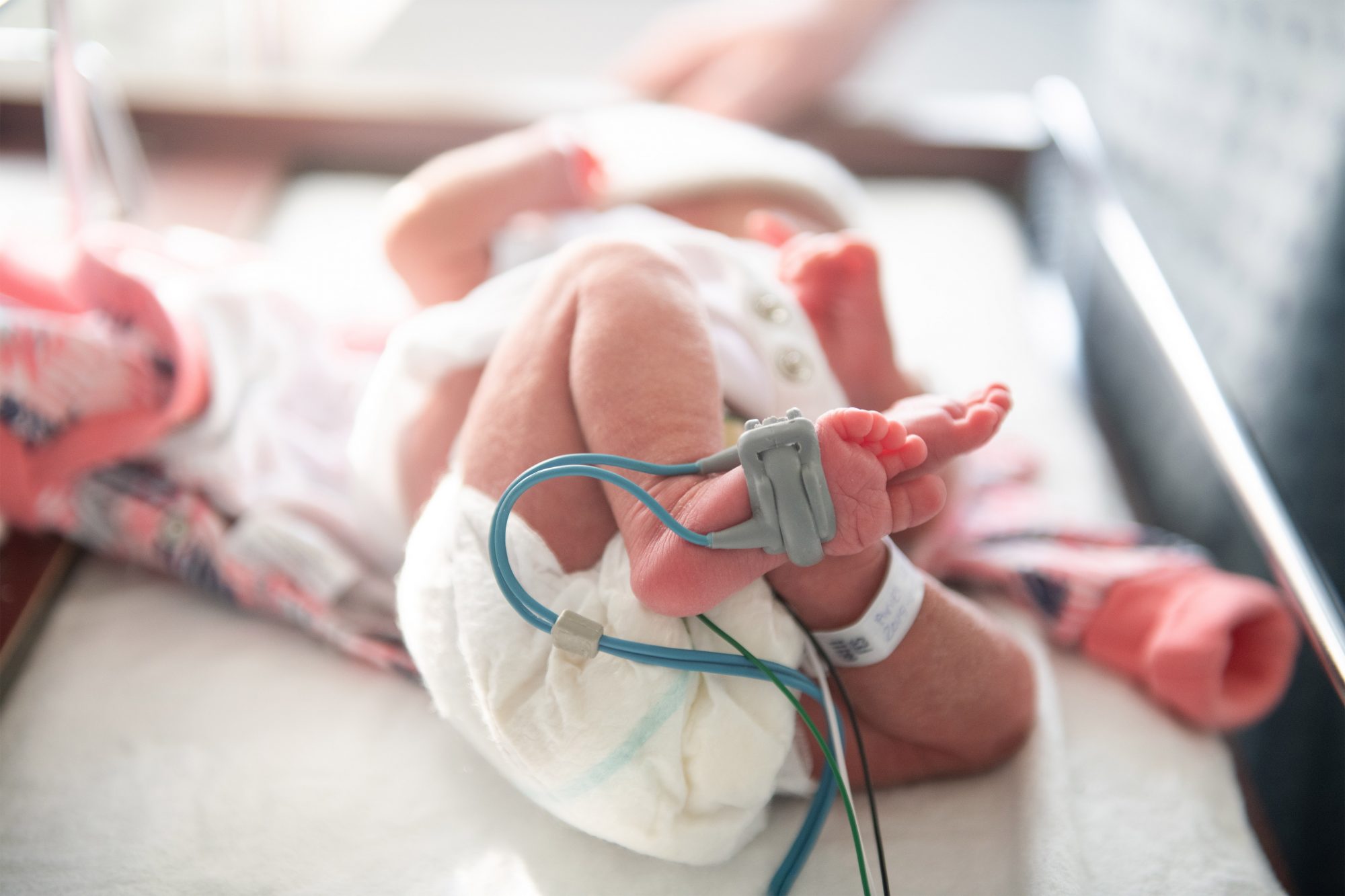
There's been an increase in prescribed opioid use among pregnant women, and it's contributed to a rise in neonatal abstinence syndrome (NAS). According to March of Dimes, NAS is a group of conditions that happens as a baby withdraws from addictive illegal or prescription drugs they encountered in the womb—most often opioids. It comes with a host of symptoms, and it's usually treated at the hospital after birth. Keep reading to learn more about the long-term health effects and treatment options for neonatal abstinence syndrome in babies.
1. Neonatal abstinence syndrome happens when drugs pass through the placenta.
The placenta is your baby's lifeline during pregnancy, and it supplies oxygen and food through the umbilical cord. Unfortunately, drugs can also pass through the placenta, and the unborn baby can become dependent on them. Neonatal abstinence syndrome happens because newborns are no longer exposed to the drug after birth, leading to withdrawal symptoms.
NAS commonly results from use of opioids during pregnancy. These include prescription painkillers (like codeine, morphine, hydrocodone, oxycodone, and tramadol) and the street drug heroin. However, NAS can also be triggered by antidepressants, barbiturates, benzodiazepines (sleeping pills), and other drugs.
2. NAS is currently on the rise.
The incidence of opioid disorders at delivery has more than quadrupled from 1999 to 2014, reports the Centers for Disease Control and Prevention (CDC). "According to 2016 data from the Healthcare Cost and Utilization Project (HCUP), which is managed by the U.S. Agency for Healthcare Research and Quality, seven newborns were diagnosed with NAS for every 1,000 newborn hospital stays," says the CDC. That means one baby is diagnosed with NAS every 19 minutes in America.
"High prescribing rates of opioids to women during pregnancy have probably contributed to recent increases in neonatal abstinence syndrome," says Nora Volkow, director of the National Institute on Drug Abuse. "The steep increase in the number of opioid prescriptions dispensed in the United States has been associated with a parallel rise in their misuse, fatal overdoses, and heroin use."
3. It can cause health complications for infants.
Babies with NAS have an increased risk of premature birth, sudden infant death syndrome (SIDS), low birthweight, jaundice, and seizures. And while the effects of opioid exposure on the fetal brain are largely unknown, studies in rodents have linked drug use during pregnancy to birth defects in the central nervous system. Human epidemiological studies have also found an association between opioid use and neural tube defects. Finally, NAS can lead to an increased risk of long-term hearing and vision problems, motor issues, learning and behavior difficulties, speech and language setbacks, sleep problems, disrupted attachment between mother and baby, and developmental delays.
4. NAS symptoms appear soon after birth.
Most babies experience NAS symptoms within 3 days of birth, but they sometimes take weeks to appear. According to March of Dimes, common signs of NAS in babies include:
March of Dimes adds that NAS symptoms may last between 1 week to 6 months.
It's important to note that NAS doesn't always present the same way; symptoms depend on the type and quantity of drug used, when the drug was last taken, how the mother's body processes the drug, and the baby's gestational age at birth. NAS symptoms may be more severe if the mother used other addictive drugs in addition to opioids.
5. Neonatal abstinence syndrome scoring can help diagnose the condition.
If NAS is suspected, healthcare providers will ask the mother about her drug use and take a urine test, if necessary. They might check the newborn's meconium (first bowel movement) and urine. Neonatal abstinence syndrome scoring—which involves assigning points based on a baby's symptoms—can also determine the severity of the withdrawal and the best course of treatment.
6. Most babies get treated in the hospital.
NAS treatment depends on your baby's symptoms. In severe cases, doctors may give them medications in gradually decreasing doses to gently wean them off drugs. IV fluids may be necessary to prevent dehydration, and high-calorie baby formula can help overcome feeding issues. Babies with NAS sometimes get treated in the neonatal intensive care unit (NICU).
Healthcare providers will watch your newborn for about a week during treatment. March of Dimes says that babies may be fussy and irritated. To calm them down, parents can try soothing techniques like swaddling, breastfeeding, rocking, and skin-to-skin contact.
7. Pregnant parents-to-be and their doctors can take measures to avoid neonatal abstinence syndrome.
Volkow recommends that opioids should only be prescribed to pregnant women with severe pain that can't be controlled with less harmful treatments, and ideally they should be limited to short-term use. She did add, however, that if long-term use is unavoidable—for women in need of treatment for heroin addiction, for example—then careful assessment and monitoring should be carried out to reduce the risk of overdose, misuse, and neonatal abstinence syndrome.





